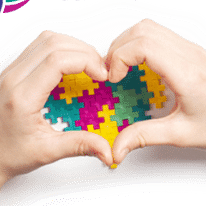- Contact Us
- (908) 874-0417
- Member Login
- Get Listed Now

Signs of autism in babies can be subtle and challenging to identify, especially for first-time parents who might not be familiar with typical developmental milestones. Parents may start to notice that something is off with their baby but struggle to pinpoint the issue. This can lead to feelings of frustration, confusion, and even guilt as they attempt to navigate the complexities of their child’s behavior and development. Parents also often run into some skepticism or dismissive attitudes from family members, friends, and daycare providers. While those who seem dismissive usually mean well and hope to ease the parent’s minds, they may not be well-versed in autism or might simply chalk up the baby’s behavior to the usual developmental differences.
Autism Spectrum Disorder (ASD) is a complex developmental disability that affects a person’s behavior, communication, and social skills. The term “spectrum” refers to the wide range of symptoms and levels of severity that can be observed in individuals with autism. While signs of autism can appear at any age, they often become apparent between 12 and 24 months of age. However, many symptoms can be seen in infants as young as six months old. Recognizing these early signs is crucial to ensure appropriate support and intervention for the child.
Milestones in child development refer to specific skills and abilities children are expected to reach at certain ages. These milestones provide a framework for understanding a child’s development and progress. They are typically categorized into different areas of development, including physical, cognitive, social, and emotional development.
Physical Development: Physical milestones refer to a child’s gross and fine motor skills. Some important physical milestones include rolling over, sitting up, crawling, walking, running, jumping, throwing and catching a ball, and using utensils to eat.
Cognitive Development: Cognitive milestones refer to a child’s intellectual and thinking abilities. Some of the important cognitive milestones include recognizing and responding to familiar faces and voices, exploring objects with hands and mouth, babbling and cooing, saying their first words, following simple instructions, solving problems, and understanding cause and effect.
Social Development: Social milestones refer to a child’s ability to interact with others and form relationships. Some important social milestones include smiling and laughing, making eye contact, responding to their name, engaging in parallel play with other children, showing empathy, understanding and following social norms and rules, and developing friendships.
Emotional Development: Emotional milestones refer to a child’s ability to understand and manage their own emotions and respond to the feelings of others. Some of the important emotional milestones include developing a sense of trust and security, expressing and labeling emotions, recognizing the emotions of others, understanding and managing anger, fear, and frustration, and developing self-esteem.
It’s important to note that while these milestones provide a general guideline for typical child development, every child is unique and may reach these milestones at their own pace. Parents and caregivers should also consider other factors that may impact a child’s development, such as their temperament, environment, and experiences.
Babies go through several developmental milestones during their first year of life. Here are some of the primary milestones for babies and when they typically occur:
Smiling: Babies typically begin to smile in response to stimuli such as a parent’s face or voice at around 6 weeks of age.

Cooing and babbling: Babies start to make cooing and babbling sounds between 2 and 3 months old.
Rolling over: Between 4 and 6 months, babies usually learn to roll over from their tummy to their back and vice versa.
Sitting up: Between 6 to 8 months of age, babies can usually sit up unsupported.
Crawling: Many babies begin crawling between 6 to 10 months of age, but some may skip crawling altogether and move straight to walking.
Gesturing: At around 8 to 12 months of age, babies may begin to use gestures like pointing or waving.
First words: Babies typically start saying their first words at around 10 to 12 months of age, but this can vary widely.
Remember that these are general guidelines and that every baby develops at their own pace. If you have concerns about your baby’s development, talk to your pediatrician.
The idea that children with autism always have delays in their social, emotional, communication, cognitive, and physical skills is not entirely accurate. While they may have difficulty in certain areas, some children with autism can reach some of their milestones on time or even earlier than expected. However, they may experience delays or struggle with other skills. Some children may appear to learn new things but find it challenging to apply them in real-life situations. High-functioning autistic children may be able to compensate for or hide their delays, making it hard to diagnose based on milestones alone.
When a baby is born with autism, it doesn’t change how they look physically. However, it can affect how they communicate and interact with the world around them. Although most children receive an autism diagnosis at an older age, some parents can and do identify autism indicators in babies, depending on the severity and manifestation of symptoms. Although each baby develops at their own pace, being aware of possible warning signs related to development goes a long way.
If you notice any developmental differences in your child, bring it up with their doctor or healthcare professional. They can help you understand what’s happening and provide support and resources for your child and family.
Most toddlers with autism will start to sit, crawl, and walk at the appropriate time. However, the most significant differences in toddlers will begin to reveal themselves in communication, social interactions, and behavior. This blog focuses on babies, but for signs of autism in toddlers, see our earlier blog post.
Early intervention refers to specialized services and support provided to children with autism and their families. These services can include speech therapy, occupational therapy, and Applied Behavior Analysis (ABA) therapy. Early intervention aims to improve the child’s developmental trajectory by addressing their specific needs and promoting positive outcomes.

Research has shown that early intervention can significantly improve long-term outcomes for children with autism. The earlier the intervention, the better the chances of reducing or minimizing the impact of autism on the child’s life. Early intervention can help improve social, communication, and cognitive skills, making it easier for the child to navigate their environment and form meaningful relationships.
While there is no specific age limit for starting intervention, it is generally recommended to begin as soon as a child is identified as having or being at risk for autism. Early identification and intervention are crucial for maximizing the benefits of the support services.
Yes, a baby typically needs an assessment before autism intervention can begin. The assessment should be conducted by a qualified healthcare professional, such as a pediatrician, developmental pediatrician, psychologist, or psychiatrist with experience in diagnosing ASD.
Parents should trust their instincts if they suspect their baby might have autism. Early intervention can make a significant difference in a child’s development and help equip them with the tools to thrive. ABA therapy should happen as quickly as possible after a diagnosis of autism. Of course, older children can still benefit. Still, the children who receive services at a younger age tend to be nearly indistinguishable from their peers as they age.
There’s a wealth of information, from books to articles to talking with other parents whose children have a similar diagnosis. ASD can be complex but don’t be afraid to ask questions – doctors, teachers, and other professionals who work with children with ASD are there to help. Understandably, the journey to diagnosis and treatment can be stressful, but finding emotional support can make a big difference. As a parent, it’s easy to focus solely on your child and forget to care for yourself. This is especially true for parents of children with ASD, so it’s essential to make time for you and practice self-care. Remember, you’ve got this!
Circle Care Services is an ABA therapy center in New Jersey that specializes in catering to the unique needs of children with autism and their families. We work closely with you to develop a customized treatment plan that meets your baby’s specific needs while considering your family’s needs too. Through ABA therapy, we aim to help your baby reach their developmental milestones, set them on the right path to learning and growing, and equip them with the skills they need to thrive in school, their community, and beyond. If you’re interested in learning more, consider signing up for our email list! We send helpful tips and tricks for parents of children with autism who might benefit.
|
|
Added By: | |

|
Circle Care Services Family Activities Highland Park, NJ 08904 US |
| View Profile » Contact » | |
